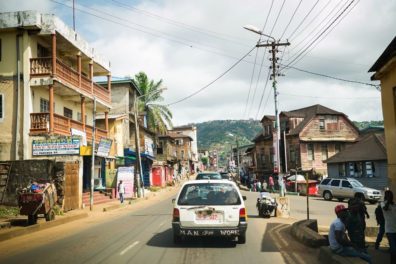Subnational and Property Tax
While policymakers and academics have increasingly given attention to national-level taxation in developing countries, local government taxation has remained relatively neglected. Yet local taxes have broad and direct impacts on citizens in low-income countries and are likely to have important implications for small business growth, local service delivery, equity, governance, and accountability. Property taxes are of particular interest, as they have significant revenue potential and are non-distortionary, progressive and easily linked to public services – but are nonetheless severely underused in almost all developing countries. Our research aims to build a more extensive body of empirical research on the potential reform of subnational and property taxes, with an emphasis on political economy challenges and cross-country comparison.
Publications:
The importance of tenure security for development and wellbeing is often reduced to questions about how titles can guarantee rights, overlooking the contested and layered nature of property rights themselves. We use the case of Lagos to analyse property rights as ‘analogue’ rather than ‘digital’ in nature – things that only exist by degree, where…
Efforts to reform property tax systems in African cities tend to focus more on how to value properties for purposes of tax assessment than on how to better collect taxes due. The same is true of the literature on property tax reform. There is however reason to believe that a greater initial focus on improving…
The current method of property valuation in Freetown, Sierra Leone is highly inaccurate and generally regressive, as it does not take subjective property characteristics that are major determinants of value into account. The newly elected Mayor Yvonne Aki-Sawyerr made revenue mobilisation a central pillar of her ‘Transform Freetown’ agenda. As a means of achieving this,…
Uganda embraced decentralisation as a system of governance in the early 1990’s. The success of decentralisation was pegged on the capacity of the local governments to mobilise their own revenues in order to fulfill their responsibilities. Before its suspension in 2005 and eventual abolition in 2008, graduated tax constituted a dominant source of local revenue….
Uganda was among the first African countries to embrace a decentralised system of government in the 1990s. The objective of this policy was to bring services closer to the people while at the same time enhancing local participation and democracy. The success of decentralisation was, however, greatly dependent on the amount of funds and other…
Public finance theory suggests that property tax is an ideal local tax. But it’s also a ‘data-hungry’ tax, making it difficult and costly to administer properly— especially at the local government level where capacity, skills and resources are often lacking. Given its high data demands, property tax administration lends itself to the application of modern…
Purpose Inter-organisational cooperation in revenue collection has received limited attention in the tax administration literature. Recent experiences from Tanzania offer a unique opportunity to examine opportunities and challenges facing such cooperation between central and local government agencies in a developing country context. The administration of property taxes (PT) in Tanzania has been oscillating between decentralised…
Property taxes are an important revenue source for subnational governments. Across sub-Saharan Africa collection of property taxes is made up of several distinct processes, some situated at the national level, and some at the local level. Thus, inter-organisational cooperation and institution-based trust are essential for the successful implementation of property taxation. Because of the common…
Property taxes are a major source of revenue at sub-national levels in most countries, but their administration is complex, and in most cases the process involves both national and sub-national governments. In Kenya, county governments have legislative authority to levy property taxes and the responsibility to finance some of the cost of the services they…
Property tax is tax charged on real estates or immovable assets. The tax base may be on land only, land and improvements on the land, or improvements on the land only. For the purpose of this paper property tax shall be referred to as tax on all types of immovable properties, residential, commercial and industrial,…
Blogs:
One of the strongest arguments for investing in the tax capacity of developing countries is the supposed participation dividend of taxation. Beyond providing more tax revenue with which the government can supply essential public services, tax collection is thought to stimulate citizen engagement in the government, and ultimately, political accountability. The accumulated evidence of a…
Recurrent episodes of marginal communities being evicted from the waterfronts of Lagos have made global media headlines over the last four years. Up until 2016, the city had earned a hard-won status as a model of good urban governance for Africa. Along with better transport systems, waste management and security, the Lagos state government had re-established control over planning and…
In the next few weeks, residents of Freetown are expecting to receive new property tax bills as part of a revamped and more progressive system. Approved as Sierra Leone was entering lockdown in mid-April, the revised arrangement places a greater onus on the richest and could increase the capital’s tax revenue five-fold. The new system has been…
Research Projects:
This research programme seeks to address four overlapping questions through a combination of (a) randomized controlled interventions in the reform programme, (b) exploiting discontinuities in the implementation of reform to identify causal impacts, (c) systematic tracing of the impact of the reform programme on popular attitudes and behaviours, and (d) the mapping of compliance data…
Project Outputs
Blog
How do government actions toward the poor influence other citizens’ perceptions of the government? Does making citizens aware of forced evictions – used by the government in the name of development – reduce their willingness to invest in the capacity of the government by paying taxes? We seek to build upon our 2018 pilot survey…
Graeme Stewart-Wilson will be working with researchers and tax authorities in Sierra Leone to document and derive lessons from ongoing and relatively successful reform efforts. He will be writing up at least two case studies – one related to reform efforts at the National Revenue Agency, led by long time ICTD partner Samuel Jibao, and…
The IMF and World Bank revenue statistics show that, between 2000 and 2012, property taxes represent on average of 0.1 to 0.2% of GDP in Sub-Saharan Africa (0.1% in Senegal). In OECD countries, the average range is between 2-3% of GDP. This poor performance suggests considerable scope for improvement. In Senegal, as in most developing…
How do states in a low-tax, low-capacity equilibrium spur citizens to start paying taxes? This experiment would examine the direct and network effects of an increase in tax enforcement by the government on tax compliance. We partner with the Provincial Ministry of Taxation and randomly assign firms in the city of Kananga, DRC, to one…
The African Property Tax Initiative (APTI) has increasingly been approached by governments in sub-Saharan Africa interested in exploring simplified approaches to property valuation for property taxation. This interest grows out of ICTD research which has demonstrated the efficacy of this approach and several secondary cities in Africa, and which has more generally argued for the merits…
This study will evaluate the experience of KCCA in the enforcement and collection of property rates with an objective of understanding some of the reasons why the Authority has been more successful than the rest of the urban authorities and local governments (four of these will be studied alongside KCCA). In particular the study will…
The main objective of this research is to examine the collaborations between national and County Governments in property tax administration with the aim of elaborating the policy frameworks and practices; and to articulate the general challenges in Kenya and specifically in Kiambu and Laikipia Counties; and to provide policy recommendations based on the findings.
This working paper adopts an urban lens on property tax. It focuses specifically on how property tax operates in two African secondary cities, Kisumu (Kenya) and M’Bour (Senegal). The paper identifies three factors shaping the low levels of property tax collection in the two case cities. These are the misalignment between the spatial scale of…
Project Outputs
Working Paper
This project is exploring a number of different questions. What challenges do the relationship between the central and local governments pose in property tax administration in Ghana? How has the relationship between the central and local government continued to affect the administration of property tax in Ghana? Why is decentralisation so problematic in Ghana? What…



